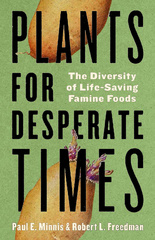
Reimagining Marginalized Foods
Global Processes, Local Places
With globalization has come an increased focus on food—where it comes from, how it is transported, who eats it, and what cultural significance it has. This volume brings together ethnographically based anthropological analyses of shifting meanings and representations associated with the foods, ingredients, and cooking practices of marginalized and/or indigenous cultures. Contributors are particularly interested in how these foods intersect with politics, nationhood and governance, identity, authenticity, and conservation.
The chapters cover diverse locales, issues, and foods: the cultural meanings of sinonggi, a thick sago porridge from Sulawesi, Indonesia; the significance of pom, a Surinam dish popular in the Netherlands; the transformation of alpaca meat in Peru; the impact of culinary tourism on indigenous cuisine in Mexico; the re-presenting of minor millets in South India; and the development of cheeses in the Italian Alps. A conceptual essay on food and social boundaries rounds out the collection.
Throughout, the contributors address important questions, including: How are traditional foods “repackaged” in the process of mainstreaming access? What does this repackaging mean for the ways local or indigenous peoples view their traditional food practices? How are local cuisines mobilized in movements to create national images and identities? What tensions emerge between new representations of foods and local cultural meanings?
Together the contributors provide a thoughtful inquiry into what happens when food and culinary practices are moved from the cultural or physical margins, and how such movements can be shaped by—and employed in the pursuit of—political, social, and cultural goals.
These essays are highly original, creative, and provocative.’—Warren Belasco, author of Food: The Key Concepts
‘This collection ably makes it clear that scholarly analyses of foodways in their cultural context provide a complex and fruitful way to consider the effects of global issues on local cultures.’—Rachelle Saltzman, Project Director of Iowa Place-Based Food
These essays are highly original, creative, and provocative.’—Warren Belasco, author of Food: The Key Concepts
‘This collection ably makes it clear that scholarly analyses of foodways in their cultural context provide a complex and fruitful way to consider the effects of global issues on local cultures.’—Rachelle Saltzman, Project Director of Iowa Place-Based Food
Elizabeth Finnis is an associate professor in the Department of Sociology and Anthropology at the University of Guelph in Guelph, Ontario, Canada.
Elizabeth Finnis
1. Loving People, Hating What They Eat: Marginal Foods and Social Boundaries
Richard Wilk
2. Highland Haute Cuisine: The Transformation of Alpaca Meat
Lisa Markowitz
3. Redefining the Cultural Meanings of Sinonggi during the Indonesian Decentralization Era
Wini P. Utari
4. When the Marginal Becomes the Exotic: The Politics of Culinary Tourism in Indigenous Communities in Rural Mexico
Lois Stanford
5. Discovering Pom’s Potential
Karin Vaneker
6. Redefining and Re-presenting Minor Millets in South India
Elizabeth Finnis
7. Developing Cheese at the Foot of the Alps
Cristina Grasseni
Conclusions: Culture, Tradition, and Political Economy
John Brett
About the Contributors
Index









